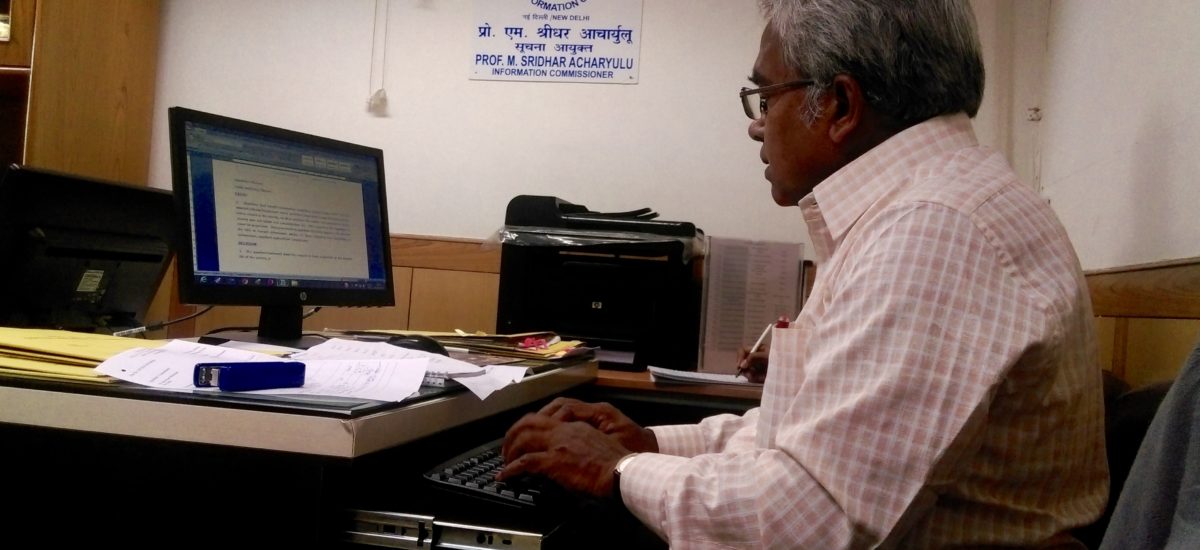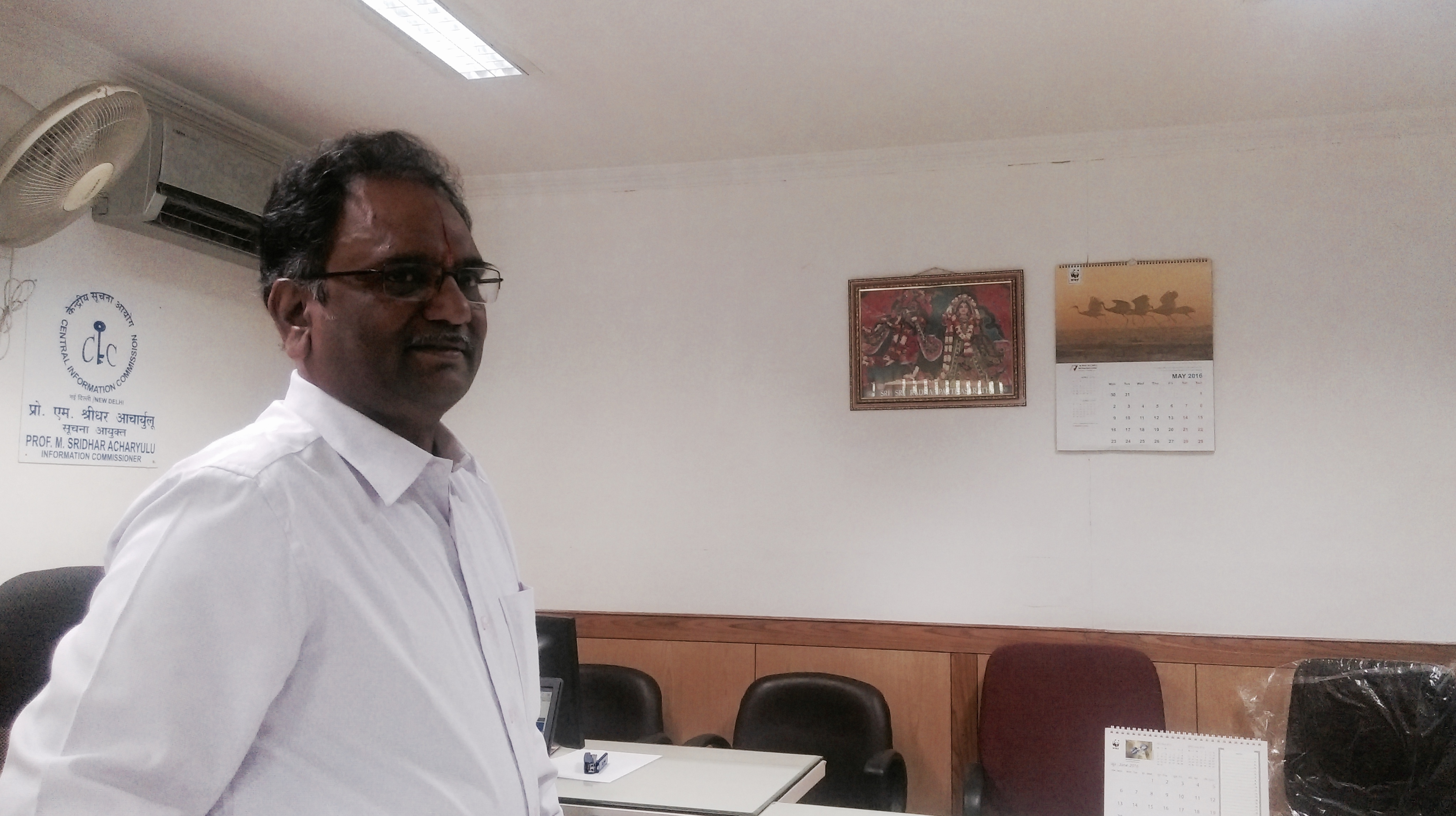Inside India’s Central Information Commission, Professor M Sridhar Acharyulu is hearing a case on illegal occupation. The applicant wants to know if the Registrar of Co-operative Societies, (RCS) which deals with housing, has complied with an order to evict an employee from one of its flats. Despite repeated reminders, leading to an order for the employee to vacate, the applicant believes no action has been taken. Acharyulu makes his decision. “The appellant has filed an RTI application seeking for a compliance report,” he dictates to another employee to types out the order. Printing it out, Acharyulu promises the appellant that he will get a response within 20 days.
The whole process doesn’t take more than 10 minutes. As the afternoon wears on, more cases are heard – one person wants to know about a fraudulent society, another wants copies of audit reports. Some of them are coming to the Commission for the second or third time, since the government departments concerned have chosen not to take action.
Acharyulu dispenses each case swiftly and decisively. A former lawyer and journalist, he is one of the few civil society members in Delhi to hold this post. His role however is not to be a judge. The Information Commission isn’t for grievance redress – it is simply meant to order departments to give out information, unless it’s classified.
Acharyulu in his office in New Delhi
India has been operating under an RTI Act since 2005, and has developed a vibrant culture around the requests it makes. People from all walks of life walk into Acharyulu’s office – from school teachers and principals to government officers. Applicant and government representative sit opposite each other at the same desk. In India, the RTI has acted as an equaliser, empowering citizens to receive information that affects their day to day lives.
The Right to Information (RTI) Bill has been the subject of limited discussion in the media in Sri Lanka even though it has been tabled in Parliament, and is scheduled for debate on June 23rd.
The common perception in Sri Lanka appears to be that this Bill is solely for journalists and the upper class – but this couldn’t be further from the truth.
In fact, examining history, RTI has been used not just by journalists, activists and the upper class, but also by the marginalised, the poor – and even by children.
An Overview
The first RTI law was passed in Sweden in the 18th century, at a time when India was economically more developed than Sweden, Venkatesh Nayak from the Commonwealth Human Rights Initiative (CHRI) revealed at a learning programme on the RTI in Delhi recently.
The RTI in Sweden was spearheaded by a Finnish clergyman, Rev. Anders Chydenius, who was influenced by the good practices of Tang China in 7th century AD.
The second country to pass an RTI law, 122 years later, is still classed as a developing country today – Colombia.
France was the first to recognize the Right to Information as a human right as far back as 1789, at a time when most French revolutionaries hadn’t even been to school. In India, the use of RTI was galvanized not by journalists or the upper middle class – but by a group of villagers in Rajasthan.
Today, 22 countries have RTI laws in Asia alone, with the latest being Afghanistan in 2015.
While the Right to Information has ties to freedom of speech and expression, it is also linked to rights which might not be apparent at first glance, such as the right to access health services, water and food.
Yet it has been a long and arduous struggle for many countries to enact RTI legislation in their countries.
Take Nepal – while the Right to Information was recognized as a fundamental right in the Constitution in 1990, the Act was only passed in 2007 following pressure from civil society, including lawyers and journalists. In Pakistan, where the Supreme Court recognized the RTI in 1993, it was only introduced as a fundamental right in 2010.
Closer to Home
India’s struggle too spans several decades – beginning with sporadic demands for transparency around rail accidents and conflict. The Supreme Court of India held RTI was to be considered a fundamental (human) right in the 1980s. The actual push to implement a dedicated Right to Information Act could be said to have begun with the Bhopal Gas tragedy of 1984, which saw a push for transparency on environmental issues. However, it was in the state of Rajasthan that a grassroots level sparked a national conversation on RTI. Villagers in Rajasthan eventually filed an RTI exposing massive corruption and misallocation of funds at the local government level. It was this adoption of the cause by villagers, rather than by journalists or dedicated activists, which sparked a national conversation, as Professor Shekhar Singh, former Convenor of the National Campaign for People’s Right to Information (a collective of civil society actors invested in promoting democracy and transparency through the use of the RTI) pointed out.
The NCPRI formulated a model RTI Act and presented it to the Government in 1996, whereupon it was promptly watered down and buried. It was only in 2002 that the Supreme Court ordered the Government to pass the Freedom of information Act.
Even then, this Act, which had several flaws, was never notified. It took a change in political leadership and years of lobbying and protests until the Government finally agreed to introduce an RTI Bill in Parliament, in 2004 – and even then, it only covered Central Government, not the states. Finally, in May 2005 the Government, after making over 100 amendments, made the Act applicable to the whole country.
Sri Lanka’s journey towards a Right to Information Bill has been no less rocky.
Traditionally, legislation such as the Official Secrets Act of 1955 and the Establishments Code of 1971 have encouraged an atmosphere of secrecy for government officials. In practice, this has meant that any interaction with a government office is a frustrating, slow-moving experience, involving many return trips and additional documentation, as Groundviews has already recorded. In a larger sense, however, this focus on secrecy has led to imbalance in power between the state and the general public on many fronts – from the passage of legislation to the simple process of getting a birth or death certificate.
It has also undeniably hampered journalists’ work – particularly investigative journalists, who have had to rely on cultivating contacts and personal connections. It is perhaps for this reason that the push for legislation pertaining from the Right to Information began in an attempt to reform media law.
The Push in Sri Lanka
The mid to late 90s saw a Committee being set up with the aim of reforming media laws and laws pertaining to freedom of expression. The recommendations of this Committee included the suggestion for a Freedom of information Act. In 1996, a draft Bill was submitted by the Sri Lankan Law Commission, which was imperfect, and was never submitted in Parliament. Following attempts to make constitutional reform in the 2000s, a draft Constitutional Bill gave the right to information the status of constitutional protection. From 2002 to 2004, media and civil society representatives, including the Editors Guild, met with the Government with the aim of pushing through a law related to RTI. This law too had weaknesses, and was stymied by the toppling of the Ranil Wickremesinghe government, leaving the RTI movement at a virtual standstill.
Former President Rajapakse made it clear that he would never endorse a Right to Information Act while he was in power. Despite this, several MPs, notably Opposition MP Karu Jayasuriya in 2011, made continued efforts to introduce the RTI Draft Bill into Parliament, as a Private Member’s Bill. Following pressure from the Government to withdraw, the Bill was eventually defeated in Parliament. It was only after the election of President Maithripala Sirisena in 2015 that the idea of Right to Information was revived, with Sirisena including it in his 100 day plan.
The Bill is set to be debated on in Parliament on June 23, with a decision made the same day. Sri Lanka stands at a crucial crossroads – but it is important to remember that the simple passage of the Act is only the beginning of the battle, as Singh pointed out.
There has been continued criticism of the RTI Bill in its current form – notably on the exemption dealing with international trade agreements and information on economic and financial policies.
However, international groups such as Article 19 have pointed out the current Bill is actually fairly strong, with the addition of the ‘public interest’ clause, which says that if information is deemed to be in the public interest, it should still be provided, even if it does fall within one of the exemptions.
Several other weaknesses have been highlighted, including the lack of penalties for Information Officers (who will be appointed for different Ministries and government bodies, and tasked with giving out the relevant information). Currently, officers who have been found to wilfully obstruct the provision of information, destroy information, refuse to appear before the Commission or otherwise refuse to implement a decision of the Commission will be fined after a summary trial in the Magistrates Court – which given the heavy case backlogs and delays already associated with Sri Lanka’s legal system, may not act as much of a deterrent.
In addition, there is no whistleblower protection for any public official who might want to flag instances of corruption or misuse of power by placing it in the public domain. E publication of information is also not mandatory under Sri Lanka’s current Act, hampering accessibility to information. Poor reporting cycles could also lead to delays or unnecessary requests – the Bill has called for annual reports to be submitted by Ministries on the number of requests received and action taken, but no deadline for these reports has been specified.
It remains to be seen how well the Bill, if passed, will be implemented on the ground. Will government officials cooperate willingly with requests for information or adopt a more defensive approach?
More pertinently, history has shown that RTI Bills, once enacted, will be of little use where not supported by sustained public advocacy and debate – and not just by civil society, but by the public at large. This has been the case in countries such as the Maldives and Nepal, for instance, Nayak pointed out.
Without sustained activism and pressure on the part of the public, the passage of the Act will lead to Sri Lanka committing to a culture of transparency in name only. What’s more, without public pressure, the weaknesses highlighted in the Act will become insurmountable stumbling blocks.
There are, in fact, many ways in which RTI legislation can help ordinary citizens in their interactions with the state – everything from filling out routine paperwork to on whether your local area is being properly maintained. However, without vibrant discourse, the struggle of over 20 years will have been in vain.


